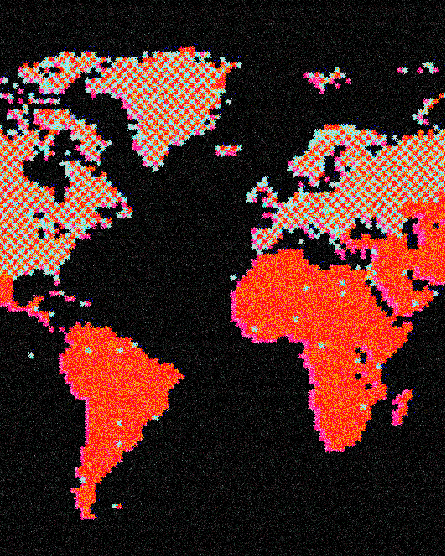
I come from Trinidad and Tobago. As a country that was once colonized by the British, I am wary of the ways that inequalities between the global north and global south risk being perpetuated in the digital age.
When we consider the lack of inclusion of the global south in discussions about artificial intelligence (AI), I think about how this translates to an eventual lack of economic leverage and geopolitical engagement in this technology that has captivated academics within the industrialised country I reside, the United States.
As a scientist, I experienced an early rite of passage into the world of Silicon Valley, the land of techno-utopianism, and the promise of AI as a net positive for all. But, as an academic attending my first academic AI conference in 2019, I began to notice inconsistencies in the audience to whom the promise of AI was directed. AI researchers can often identify consistent choices for locations where such conferences are hosted, and where they are not. NeurIPS, one of the top AI conferences, has highlighted annual issues for obtaining visas for academic attendees and citizens from the African continent. Attending such a prestigious conference in the field grants one the opportunity to gain access to peers in the field, new collaborations and feedback on one’s work.
I often hear the word “democratisation” within the AI community, an implication of equity in access, opportunity and merit for contribution regardless of one’s country of origin. Associate professor of economics Fadhel Kaboub talks about how “a lack of vision for oneself results in being a part of someone else’s vision”, reflecting on how systematically lacking an access to infrastructure results in local trade deficits in economies.
As in the time of Nafta’s promise of “free trade”, promises of “AI democratisation” today still exist and benefit mainly countries with access to tech hubs not located in the global south. While the United States and other industrialized countries dominate in access to computational power and research activity, much of the low-paid manual labour involved in labelling data and the global underclass in artificial intelligence still exists in the global south.
Much like coffee, cocoa, bauxite and sugar cane are produced in the global south, exported cheaply and sold at a premium in more industrialized countries, over the past few years we have seen influence in AI inextricably tied to energy consumption. Countries that can afford to consume more energy have more leverage in reinforcing power to shape the future direction of AI and what is considered valuable within the AI academic community.
In 2019, Mary L Gray and Siddharth Suri published Ghost Work, which exposed the invisible labour of technology today, and at the beginning of my tenure at graduate school, the heavily cited paper Decolonial AI: Decolonial Theory as Sociotechnical Foresight in Artificial Intelligence was published. It has been five years since these seminal works. What would an AI community inspired by the Brics organisation, which united major emerging economies to advocate for themselves in a system dominated by western countries, look like for the global south?
I often ask myself how AI has contributed to our legacy, and whose stories it won’t tell. Has AI mitigated issues of mistrust and corruption in less-resourced countries? Has it benefited our civic communities or narrowed educational gaps between less-resourced regions? How will it make society better, and whose society will it make better? Who will be included in that future?
A historical mistrust can impede adoption by developing countries. Furthermore, many developing countries have weak institutional infrastructures, poor or nonexistent laws and regulatory frameworks for data projection and cybersecurity. Therefore, even with an improved information infrastructure, they are likely to function at a disadvantage in the global information marketplace.
A currency is only as good as its perceived global trust. When thinking about the democratization in AI and a vision of what it could be in years to come, AI’s survival requires including more perspectives from regions such as the global south. Countries from the global south should work together to build their own markets and have a model of sovereignty for their data and data labour.
Economic models often consider a definition of development that includes a measure of improvement in the quality of life of the most marginalized of its people. It is my hope that in the future that will extend to our evaluation of AI.
-
Krystal Maughan is a PhD student at the University of Vermont studying differential privacy and machine learning

 German (DE)
German (DE)  English (US)
English (US)  Spanish (ES)
Spanish (ES)  French (FR)
French (FR)  Hindi (IN)
Hindi (IN)  Italian (IT)
Italian (IT)  Russian (RU)
Russian (RU)  3 weeks ago
3 weeks ago
























Comments